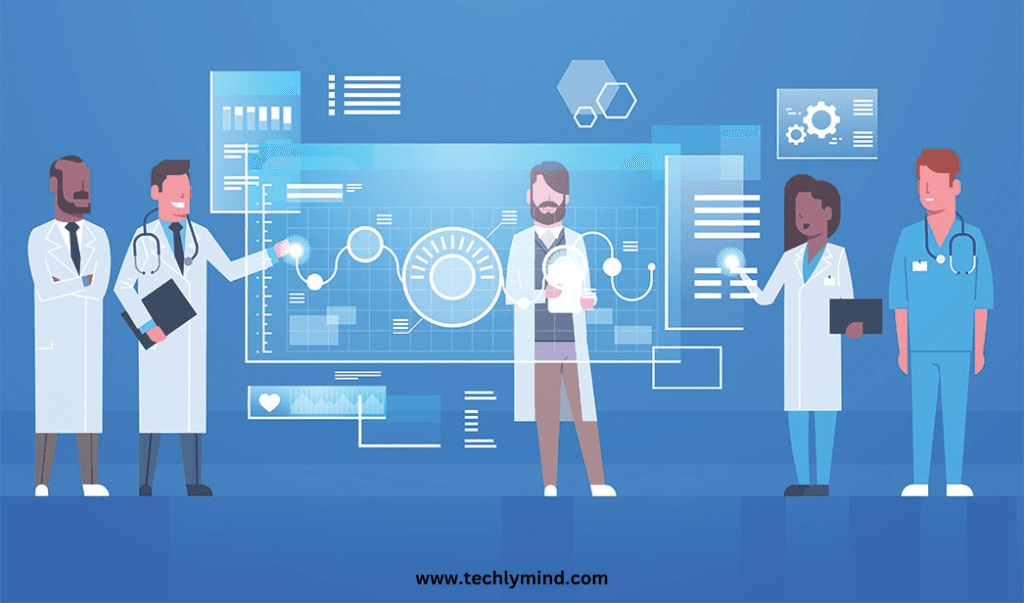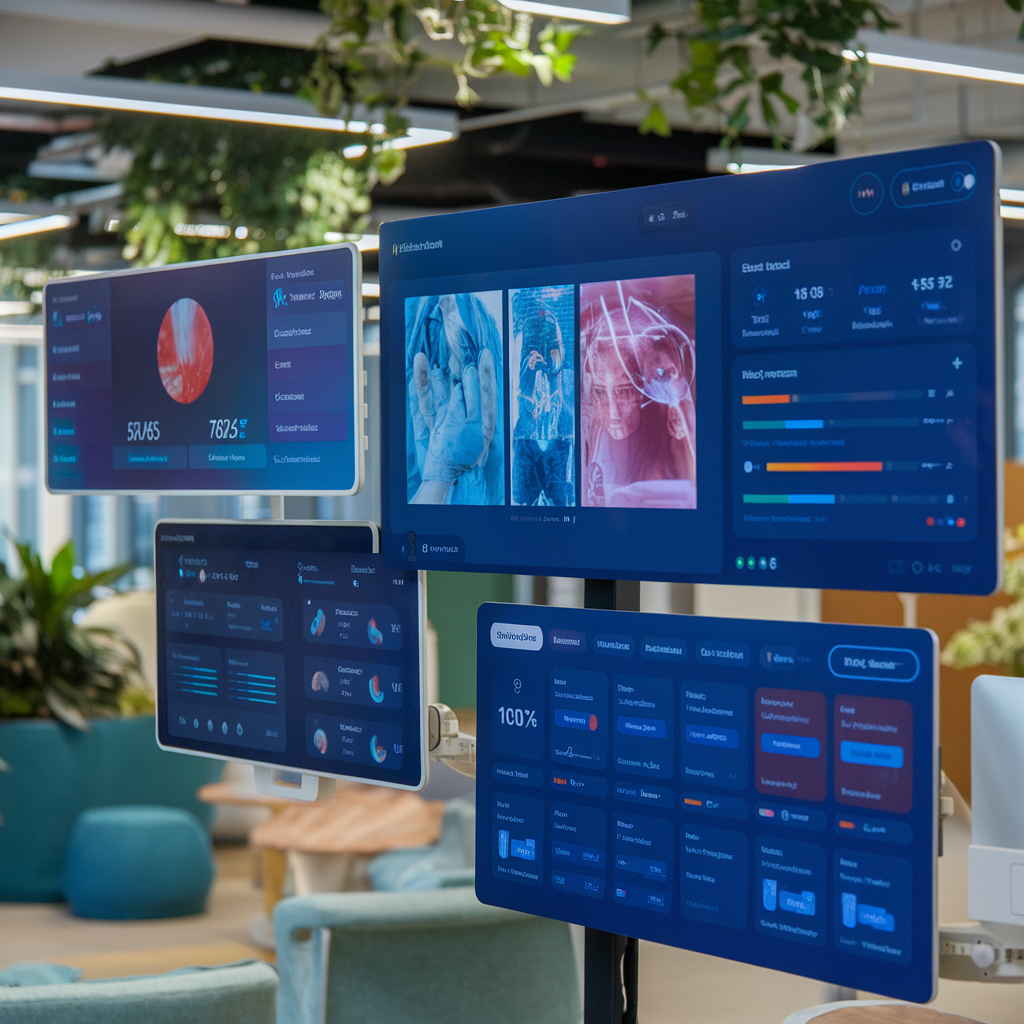How Tech Companies Are Revolutionizing Healthcare in 2025
The healthcare industry has undergone a remarkable transformation in recent years, driven by groundbreaking technological advancements. In 2025, technology companies are playing a pivotal role in revolutionizing healthcare by introducing cutting-edge solutions that improve patient outcomes, enhance operational efficiency, and make healthcare more accessible to people worldwide. From artificial intelligence (AI) that enables faster and more accurate diagnoses to wearable devices that empower individuals to monitor their health in real-time, the integration of technology is redefining the way healthcare is delivered.
Telemedicine platforms are bridging the gap between patients and healthcare providers, offering convenient and affordable consultations from the comfort of home. Additionally, innovations in data analytics, robotics, and biotechnology are streamlining processes and advancing medical research. This article explores how tech companies are reshaping the healthcare landscape, highlighting the latest trends and breakthroughs in the ever-evolving intersection of technology and medicine.
The Role of Technology in Healthcare
Technology is playing an essential role in addressing the challenges of traditional healthcare systems. From managing patient records to diagnosing diseases, tech innovations are enabling faster, more accurate, and cost-effective solutions.

Let’s delve into the specific areas where technology is making a difference:
1. Artificial Intelligence (AI) and Machine Learning
AI and machine learning are transforming the way healthcare providers diagnose and treat patients. Algorithms powered by AI can analyze vast amounts of medical data to identify patterns, predict diseases, and recommend treatments.
- Improved Diagnostics: AI-powered tools like IBM Watson Health can analyze medical imaging, lab results, and patient histories to provide accurate diagnoses, often faster than human experts.
- Predictive Analytics: Machine learning models are helping identify patients at risk of chronic diseases, enabling early interventions.
- Personalized Medicine: AI tailors treatment plans to individual patients based on genetic, environmental, and lifestyle factors.
2. Telemedicine and Remote Care
Telemedicine has surged in popularity, especially after the COVID-19 pandemic, and will continue to grow in 2025. With the help of tech companies, remote care is more accessible than ever.
- Virtual Consultations: Platforms like Teladoc Health and Amwell allow patients to consult doctors from the comfort of their homes.
- Remote Monitoring: Devices such as blood pressure monitors, glucose meters, and heart rate trackers transmit data directly to healthcare providers, enabling real-time monitoring.
- Reduced Barriers: Telemedicine eliminates geographical limitations, providing access to healthcare in rural and underserved areas.
3. Wearable Technology
Wearable devices have become ubiquitous in healthcare, empowering individuals to take charge of their health and providing valuable data to physicians.
- Fitness and Health Tracking: Devices like Fitbit, Apple Watch, and Garmin track activity levels, sleep patterns, and vital signs.
- Chronic Disease Management: Wearables help patients with diabetes, heart conditions, and other chronic illnesses monitor their health continuously.
- Early Detection: Smartwatches equipped with ECG sensors and oxygen monitors can detect irregular heart rhythms and other abnormalities early.
The Rise of Digital Health Platforms
Tech companies are creating comprehensive digital health platforms that integrate multiple services, making healthcare more efficient and user-friendly.

1. Electronic Health Records (EHRs)
Digital health platforms streamline the management of electronic health records, ensuring seamless communication between providers and patients.
- Centralized Records: Platforms like Epic and Cerner store patient data in a centralized location, accessible to authorized personnel.
- Enhanced Collaboration: Doctors, nurses, and specialists can collaborate more effectively using shared records.
- Improved Patient Engagement: Patients can access their health records, schedule appointments, and communicate with providers online.
2. Pharmaceutical Innovations
Tech companies are collaborating with pharmaceutical firms to revolutionize drug development and distribution.
- AI-Driven Research: AI accelerates drug discovery by identifying potential compounds and predicting their efficacy.
- Smart Packaging: Packaging embedded with sensors ensures proper storage conditions and provides reminders for medication adherence.
- Virtual Trials: Remote clinical trials powered by digital tools reduce costs and increase participant diversity.
3. Blockchain in Healthcare
Blockchain technology is being utilized to enhance data security and transparency in healthcare systems.
- Secure Data Sharing: Blockchain ensures that patient data is stored securely and accessed only by authorized personnel.
- Supply Chain Management: Blockchain tracks the journey of medical supplies, reducing the risk of counterfeit drugs.
- Smart Contracts: Automated agreements streamline administrative tasks, such as insurance claims.
Addressing Global Health Challenges
Tech companies are tackling global health challenges by developing innovative solutions to improve healthcare accessibility and affordability.
1. Affordable Healthcare Solutions
Innovative technologies are reducing the cost of healthcare services.
- AI-Powered Diagnostics: AI reduces diagnostic costs by automating processes.
- Open-Source Tools: Companies like Google Health offer open-source platforms for medical research and development.
- Low-Cost Devices: Affordable wearables and diagnostic tools are making healthcare accessible to low-income populations.
2. Improving Health Literacy
Tech companies are empowering individuals with knowledge to make informed health decisions.
- Mobile Apps: Apps like MyFitnessPal and HealthifyMe provide guidance on fitness and nutrition.
- Virtual Health Coaches: AI-driven chatbots offer personalized health advice.
- Online Resources: Websites like WebMD and Mayo Clinic provide reliable medical information.
3. Combating Epidemics
Tech innovations are crucial in managing and preventing epidemics.
- Disease Surveillance: AI tools analyze social media trends and health records to detect outbreaks early.
- Vaccine Development: Platforms like Moderna’s mRNA technology accelerate vaccine production.
- Contact Tracing: Apps track and notify individuals exposed to infectious diseases.
The Future of Healthcare Technology
The future of healthcare is promising, with tech companies continuing to push boundaries.

Some key trends to watch include:
1. Augmented Reality (AR) and Virtual Reality (VR)
AR and VR are enhancing medical training, patient care, and therapy.
- Surgical Training: AR provides real-time guidance during surgeries, improving precision.
- Therapeutic Applications: VR helps treat mental health conditions like PTSD and anxiety.
- Patient Education: AR visualizes complex medical procedures for better understanding.
2. Robotics in Healthcare
Robots are transforming healthcare delivery, particularly in surgery and caregiving.
- Surgical Robots: Systems like da Vinci enable minimally invasive procedures with high accuracy.
- Caregiving Robots: Robots assist elderly and disabled patients with daily tasks.
- Lab Automation: Robots streamline laboratory processes, reducing errors.
3. Genomics and Precision Medicine
Advancements in genomics are paving the way for personalized treatments.
- Gene Editing: Tools like CRISPR enable the editing of faulty genes to treat genetic disorders.
- Customized Therapies: Genomic data helps develop targeted treatments for cancer and other diseases.
- Predictive Genomics: Analysis of genetic data predicts disease risks, enabling preventive measures.
Challenges and Ethical Considerations
While technology is transforming healthcare, it also presents challenges that must be addressed.
1. Data Privacy and Security
With the digitization of health records, protecting patient data is paramount.
- Cybersecurity Threats: Hackers may target healthcare systems, compromising sensitive information.
- Regulatory Compliance: Companies must adhere to laws like HIPAA and GDPR to ensure data privacy.
- Ethical AI: Ensuring that AI algorithms are free from biases and errors is critical.
2. Accessibility Gaps
Despite advancements, technology may not reach everyone equally.
- Digital Divide: Limited internet access in rural areas hinders telemedicine adoption.
- Affordability: The high cost of some technologies may exclude low-income populations.
- Language Barriers: Multilingual support is essential for global accessibility.
3. Adoption and Integration
Integrating new technologies into existing systems can be challenging.
- Training: Healthcare providers need training to use new tools effectively.
- Resistance to Change: Some professionals may be hesitant to adopt new technologies.
- Interoperability: Ensuring that various systems work together seamlessly is crucial.
The Impact of Tech Companies on Healthcare Workforce
The integration of technology into healthcare is not only transforming patient care but also reshaping the workforce. With the rise of Artificial Intelligence, automation, and telemedicine, healthcare professionals are experiencing a shift in their roles, skill sets, and daily tasks. While some traditional tasks may be automated, new opportunities are emerging for healthcare workers to leverage technology in ways that enhance patient care and improve operational efficiency.
1. AI-Assisted Decision Making
Artificial intelligence is playing a critical role in supporting healthcare professionals by assisting with decision-making processes. AI algorithms can analyze vast amounts of medical data and provide evidence-based recommendations to doctors, nurses, and specialists. This allows healthcare providers to make more informed decisions quickly and accurately.
- Enhanced Decision Support: AI can alert doctors about potential complications, suggest alternative treatment plans, and provide up-to-date research, all helping to optimize patient care.
- Time-Saving: AI tools reduce the time spent on routine tasks, allowing healthcare professionals to focus on higher-level care.
2. Automation of Administrative Tasks
Administrative duties such as scheduling appointments, billing, and patient documentation can be time-consuming and prone to errors. With the help of automated systems, healthcare staff can reduce manual tasks and improve workflow efficiency.
- Automated Scheduling: AI-driven scheduling platforms ensure that appointments are allocated based on physician availability and patient needs, preventing scheduling conflicts and reducing administrative burden.
- Billing Automation: Automation tools handle medical billing, ensuring that claims are processed promptly and accurately, reducing the chance of billing errors.
3. Training and Upskilling
As technology evolves, healthcare professionals must continuously learn and adapt to new tools and systems. This is creating new opportunities for training and professional development.
- Online Education Platforms: Healthcare workers are increasingly turning to online courses and certifications to stay up-to-date on the latest technologies and treatments.
- Simulation and Virtual Training: VR and AR simulations allow healthcare providers to practice new skills, such as surgical techniques or patient interactions, in a controlled environment before applying them in real-world situations.
Why Data Privacy Matters More Than Ever in 2025: In an increasingly digital world, protecting personal data is more critical than ever as the volume of sensitive information grows across industries.
Conclusion
In 2025, tech companies are revolutionizing healthcare by introducing groundbreaking innovations that improve patient care, enhance efficiency, and address global health challenges. From AI and telemedicine to wearable devices and genomics, the possibilities are endless. However, it is equally important to address the challenges associated with these advancements to ensure that technology benefits everyone.
As we move forward, the collaboration between tech companies, healthcare providers, and policymakers will be essential in shaping a future where technology truly transforms healthcare for the better. The journey has just begun, and the potential is limitless.



Well prepared
Fantastic 👍
Good
Good g
Good
Great